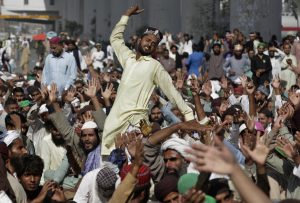The government of Pakistan has signed yet another agreement with the Tehreek-e-Labbaik Pakistan (TLP) after a two- week-long protest by the group, which killed scores of policemen and caused massive economic losses.
It has refused to divulge details of the deal done with the proscribed group. One of the reasons for the government not making public the agreement it signed with the TLP is criticism and pressure it could draw internationally.
Apparently, the government has accepted the TLP’s demand that it be allowed to operate as a regular political party.
An agreement with the TLP does not come as a surprise. When the protest started, it was anticipated that the government would have to make some sort of deal with the TLP to end the demonstrations.
However, the government was not expected to surrender to the group in such a way that it would virtually hand over the state’s writ to the TLP in order to keep it off the streets.
Here is what we have learned from the TLP’s latest protest.
The Imran Khan government has just concluded a deal with a group that, similar to outfits like al-Qaida and Tehrik-i-Taliban Pakistan (TTP), was banned under Pakistan’s anti-terrorism laws. The TLP was banned in April this year when it staged violent protests after its leader was arrested.
Last week, Minister for Information and Broadcasting Fawad Chaudhry said that the government had “taken a clear policy decision that the banned TLP will now be considered a militant organization.” Within days of that statement, the government thanked the TLP for coming to an agreement with it and described the deal as a win for Islam and Pakistan.
The TLP had fairly successfully conveyed a narrative that an elected government was responsible for not honoring an agreement made with the group, and hence should be held responsible for the chaos that occurred during the protests.
Mufti Muneebur Rehman, a cleric who facilitated the government-TLP talks said on Monday that some of the government’s ministers had misled the nation to believe that the TLP wanted the expulsion of the French ambassador and the closure of the French embassy in Pakistan. “So how can trust be established when government officials speak lies publicly?” he asked. Last week, Interior Minister Sheikh Rashid Ahmed said the government had solved all issues with the TLP, except the issue of the French ambassador’s expulsion from Pakistan.
During the final phase of the talks, TLP not only managed to get Rashid removed from the government’s negotiating committee but virtually brought the civilian government to its knees.
The negotiations progressed and emerged successful only after the military leadership’s intervention.
On Sunday, prominent clerics, including Mufti Muneeb and Bashir Ahmad Farooqi, met military chief General Qamar Javed Bajwa to discuss the issue. One of the clerics who met Bajwa attributed the success of the negotiations to the general’s mediation. For many, this was another reminder that the writ of the state in Pakistan is always negotiated between the security elite and clerics, with the elected government playing the role of mere bystanders.
The TLP has transformed the Barelvi sect into a group that has the wherewithal, support, and will to take on the state at moment’s notice.
Its rise in the political arena has been meteoric. In 2018, the TLP finished third in terms of votes in elections to the Punjab Assembly, surpassing the Pakistan People’s Party. Its votes have only multiplied after every protest and sit-in, and it is possible that the group may perform even better in the next election.
For the TLP, the latest protest is another effort aimed at multiplying votes across Pakistan. It is eyeing the upcoming local government elections and eventually the general election. In the coming months, we may see political leaders from Punjab and Sindh joining the TLP to win over the group’s diehard religious vote, which is rising exponentially.
The TLP has a violent narrative but perhaps that underlies its rise in Pakistan’s political landscape. Its rise is an outcome of Pakistani ruling elite never taking seriously the widely discussed warnings of a militant culture in Pakistan as a security threat.
A culture of militancy is thriving in Pakistan and there is no will or plan to tackle it anytime soon.

































